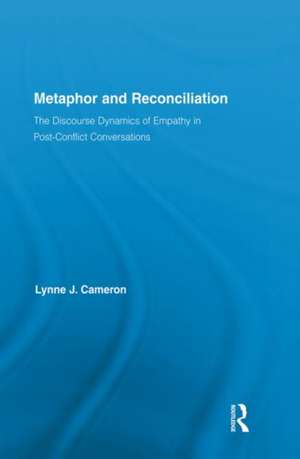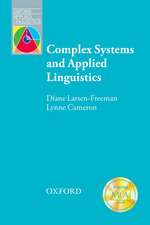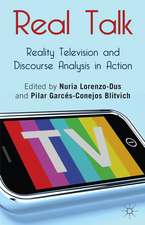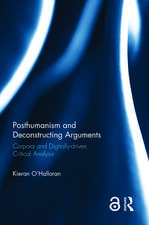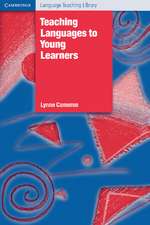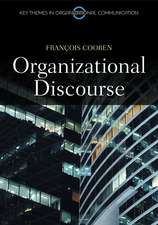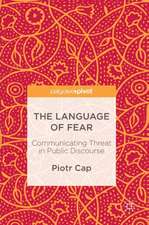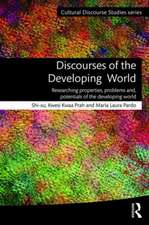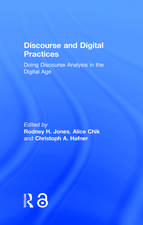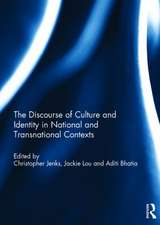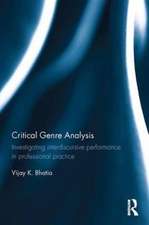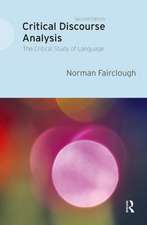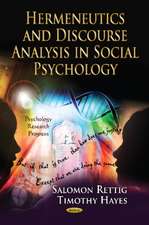Metaphor and Reconciliation: The Discourse Dynamics of Empathy in Post-Conflict Conversations: Routledge Studies in Linguistics
Autor Lynne Cameronen Limba Engleză Paperback – 29 ian 2013
| Toate formatele și edițiile | Preț | Express |
|---|---|---|
| Paperback (1) | 397.32 lei 6-8 săpt. | |
| Taylor & Francis – 29 ian 2013 | 397.32 lei 6-8 săpt. | |
| Hardback (1) | 1113.60 lei 6-8 săpt. | |
| Taylor & Francis – 8 noi 2010 | 1113.60 lei 6-8 săpt. |
Din seria Routledge Studies in Linguistics
-
 Preț: 311.41 lei
Preț: 311.41 lei - 9%
 Preț: 934.94 lei
Preț: 934.94 lei -
 Preț: 293.94 lei
Preț: 293.94 lei -
 Preț: 230.80 lei
Preț: 230.80 lei -
 Preț: 356.63 lei
Preț: 356.63 lei - 18%
 Preț: 1115.51 lei
Preț: 1115.51 lei -
 Preț: 310.12 lei
Preț: 310.12 lei - 18%
 Preț: 1007.86 lei
Preț: 1007.86 lei -
 Preț: 416.22 lei
Preț: 416.22 lei - 18%
 Preț: 1008.17 lei
Preț: 1008.17 lei - 18%
 Preț: 1108.37 lei
Preț: 1108.37 lei - 13%
 Preț: 296.19 lei
Preț: 296.19 lei -
 Preț: 380.52 lei
Preț: 380.52 lei -
 Preț: 432.63 lei
Preț: 432.63 lei - 18%
 Preț: 1010.95 lei
Preț: 1010.95 lei -
 Preț: 393.46 lei
Preț: 393.46 lei -
 Preț: 389.66 lei
Preț: 389.66 lei -
 Preț: 389.66 lei
Preț: 389.66 lei - 18%
 Preț: 1000.27 lei
Preț: 1000.27 lei - 18%
 Preț: 1006.60 lei
Preț: 1006.60 lei -
 Preț: 494.97 lei
Preț: 494.97 lei -
 Preț: 449.41 lei
Preț: 449.41 lei - 18%
 Preț: 1007.36 lei
Preț: 1007.36 lei -
 Preț: 417.36 lei
Preț: 417.36 lei - 18%
 Preț: 138.15 lei
Preț: 138.15 lei -
 Preț: 382.91 lei
Preț: 382.91 lei -
 Preț: 389.66 lei
Preț: 389.66 lei - 18%
 Preț: 1003.30 lei
Preț: 1003.30 lei -
 Preț: 384.86 lei
Preț: 384.86 lei - 15%
 Preț: 489.26 lei
Preț: 489.26 lei - 18%
 Preț: 997.90 lei
Preț: 997.90 lei -
 Preț: 462.60 lei
Preț: 462.60 lei - 18%
 Preț: 1000.27 lei
Preț: 1000.27 lei - 18%
 Preț: 1165.20 lei
Preț: 1165.20 lei
Preț: 397.32 lei
Nou
Puncte Express: 596
Preț estimativ în valută:
76.03€ • 78.90$ • 63.55£
76.03€ • 78.90$ • 63.55£
Carte tipărită la comandă
Livrare economică 15-29 martie
Preluare comenzi: 021 569.72.76
Specificații
ISBN-13: 9780415839037
ISBN-10: 0415839033
Pagini: 226
Ilustrații: 6 tables and 6 line drawings
Dimensiuni: 152 x 229 x 229 mm
Greutate: 0.64 kg
Ediția:1
Editura: Taylor & Francis
Colecția Routledge
Seria Routledge Studies in Linguistics
Locul publicării:Oxford, United Kingdom
ISBN-10: 0415839033
Pagini: 226
Ilustrații: 6 tables and 6 line drawings
Dimensiuni: 152 x 229 x 229 mm
Greutate: 0.64 kg
Ediția:1
Editura: Taylor & Francis
Colecția Routledge
Seria Routledge Studies in Linguistics
Locul publicării:Oxford, United Kingdom
Public țintă
PostgraduateCuprins
List of Tables List of Figures Preface Acknowledgments Transcription Conventions 1: Coming Together: Background to the Conciliation Process 2: The Discourse Dynamics Approach to Metaphor and Empathy 3: Metaphor Analysis 4: Conciliation as journeys of understanding and listening to stories 5: Metaphor Clusters and Absences 6: Connection and separation in conciliation 7: Becoming Involved in Violence 8: The Impact of Violence 9: Appropriating the Other’s Metaphors 10: Metaphor, Reconciliation and the Dynamics of Empathy 11: Images of Empathy Appendix: Using Metaphor in Reconciliation: Implications for Mediators Notes Bibliography Index
Notă biografică
Lynne J. Cameron is Professor of Applied Linguistics at the Open University, UK, and Research Fellow in the Global Uncertainties programme of the UK Economic and Social Research Council. Publications include Researching and Applying Metaphor (with Graham Low, 1999), Metaphor in Educational Discourse (2003), Metaphor Analysis: A guide to research practice (with Robert Maslen, 2010).
Descriere
Sixteen years after her father was killed by an IRA bomb, Jo Berry had her first conversation with the man responsible. She had made a long journey, ‘walking the footsteps of the bombers’ as she put it, determined not to give in to anger and revenge but to try to understand his motivations and perspective. Her preparedness to meet Pat Magee opened up a path to empathy that developed through their conversations over the following years. This book studies their growing understandings of each other by focusing on the rich networks of metaphors that appear in their conversations, and how these evolve in the process of reconciliation. The innovative research method, reported in a rigorous but accessible style, together with the rich and often poignant data, make this book a valuable addition to the study of metaphor and discourse. In uncovering the development of empathy between these two extraordinary people, Cameron illuminates the moral necessity, and the potential rewards, in trying to imagine the world and mind of the Other. Implications are drawn for how mediators in reconciliation contexts might make positive use of metaphor in supporting the dynamics of empathy.
